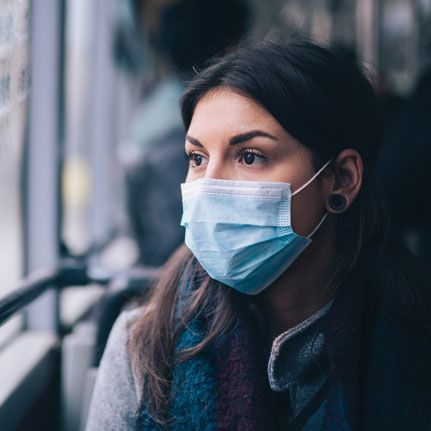Do Americans see COVID-19 as a personal threat?
Editor’s Note (4/27/2020): This article was updated to include findings from our research into how COVID-19 has impacted American lifestyles. The new information, shared below, examines access to medical care for Americans based on their health status. Learn more about the ICF COVID-19 Monitor Survey of U.S. Adults.
In an overburdened health care system, the least healthy Americans are finding it difficult to obtain medical care.
In late March 2020, most Americans reported no need, or little to no difficulty filling prescriptions (90%) and seeing a doctor or health care professional (79%) in the past seven days. However, respondents who identified as being in fair or poor health reported greater difficulty meeting their health care needs. Since January, a greater proportion of this subset of respondents reported being unable to schedule medical appointments (32%) and had appointments cancelled or rescheduled (59%) compared to more healthy respondents. These respondents also reported greater difficulty (some or a lot of difficulty) seeing a doctor or health care professional within the past seven days (33%).
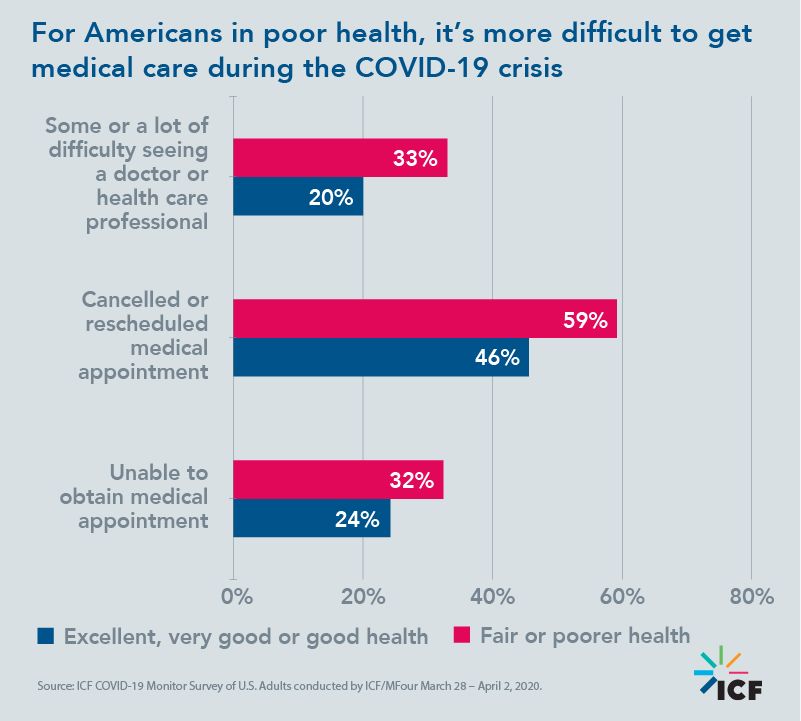
COVID-19 is a threat, but not to me
Respondents are aware of—and take seriously—the threat of the virus to the health of the U.S. population, the U.S. economy, and their communities. But few seem to feel that COVID-19 is a direct concern for them specifically—even though almost half of our respondents indicated they have an underlying medical condition (e.g., heart disease, diabetes, chronic obstructive pulmonary disease or COPD).
- At this point, the overwhelming majority of adults (73%) thought that the coronavirus was a real threat, while only 18% felt it was blown out of proportion; 9% were not sure.
- When asked how likely you think it is that you, personally, will get sick with COVID-19, at the end of March 2020, only 8% of adults said that they are very likely to catch the virus. However, another 31% feel that they are somewhat likely to catch the virus. The majority feel that they are not too likely (45%) or not at all likely (16%) to catch the virus, while 3% are not sure.
- Majority of respondents who indicated that the coronavirus was a real threat did not think it likely that they would get sick with the virus.
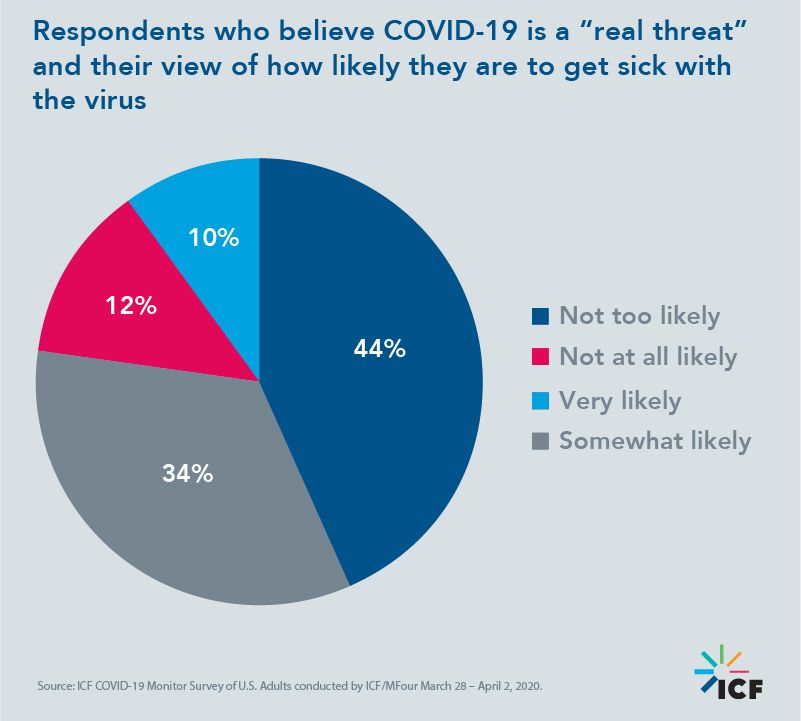
Avoiding the doctor
Approximately 15% of adults in our sample currently have one or more symptoms associated with the coronavirus (e.g., fever greater than 100.4 F, dry cough, shortness of breath). Despite their symptoms, only approximately 34% of these respondents have actually seen a doctor or other health professional about their symptoms for one of these three reasons:
- They didn’t consider their symptoms serious enough.
- They did not meet the testing criteria.
- They were concerned about exposure to the virus.
Self vs. U.S.
- Overall, 42% of this national sample rated the coronavirus (COVID-19) as a major threat to their personal health and 72% rated it as a major threat to the health of the U.S. population as a whole.
- Slightly higher proportions reported COVID-19 as a major threat to their personal financial situation (51%) and the U.S. economy (86%).
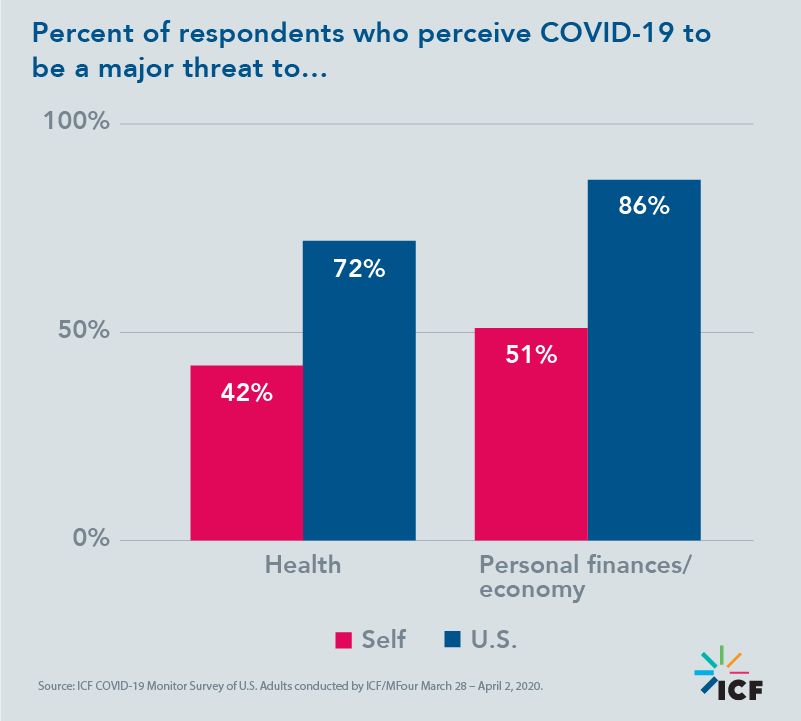
- The vast majority see it as a very major threat to the U.S. economy (86%), the health of the U.S. population (72%), and the daily life in the community (62%). About half (51%) see the coronavirus as a very major threat to their personal financial security, compared to 34% who see it as a minor threat and 15% who see it as not a threat at all. More than four out of ten (42%) see it as a very major threat to their health, but at this point more see it as a minor threat (45%) or not a threat at all (13%) to their personal health.
- The vast majority of adults in our sample (86%) describe their current health as excellent, very good, or good.
- But collectively, almost half of adults in the sample (47%) had one or more underlying health conditions (e.g. heart disease, diabetes, chronic obstructive pulmonary disease or COPD).
- When asked how worried they were that someone in their immediate family might catch the coronovirus (COVID-19), almost half (49%) said that they were very worried. Another 34% said that they were somewhat worried.
Younger demographics feel more susceptible to COVID-19
Surprisingly, the proportion of respondents who feel that it is very likely that they will get sick from the coronavirus is highest among those who are 25-34 (13%) and declines across age cohorts to 6% for persons aged 65 and older. Similarly, the proportion who feel that they are not too likely to contract the virus increases from 37% of those aged 25-34 to 54% among those who are aged 65 and older.
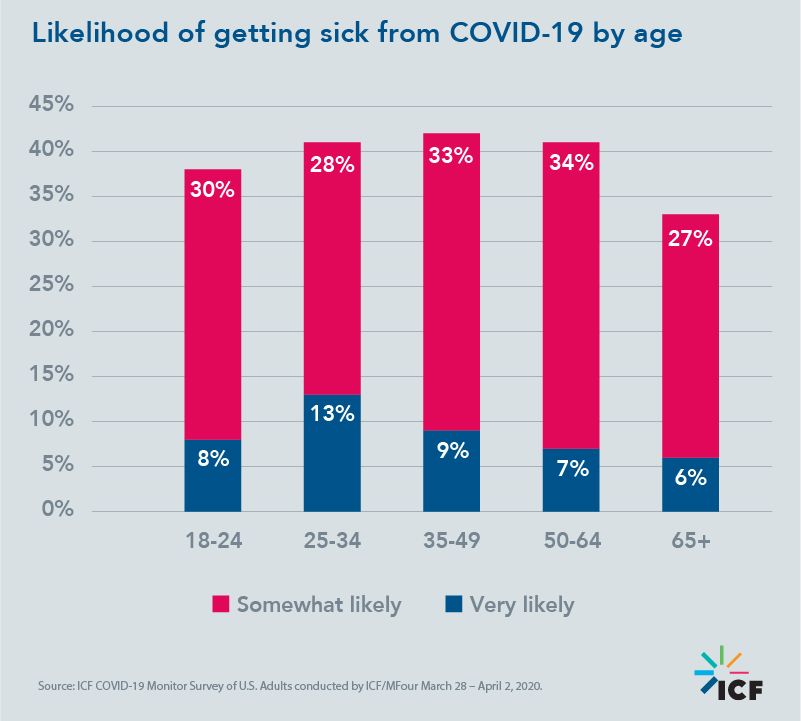
Hospital limitations are a major concern
Even if they’re not overly concerned about the threat that COVID-19 poses to their health, respondents worry about resources. Will they be able to get tested? Will hospitals be able to handle the pandemic as it surges?
Nearly three out of five survey respondents say it would be very difficult (17%) or difficult (41%) to get a diagnostic test even if they had recognized COVID symptoms. Nearly half of the sample (46%) say that they are very worried that their local hospital(s) will not have the resources to treat all patients infected with the coronavirus. Another 36% are somewhat worried. Less than one out of five say that they are not too worried (14%) or not at all worried (4%) that their local hospitals will not have the resources to treat all patients infected with the virus.
Watch this space
How will public perception change as exposure to the novel coronavirus increases? How might concern about resource limitations impact the way people behave? We will continue to share key findings from our data collection efforts over the coming weeks and encourage public health officials to bear this information in mind as you shape your response to COVID-19. Sign up to receive alerts as we roll out upcoming results and package our insights into reports. Next up, mental health insights.
Read other insights in the ICF COVID-19 Monitor Survey of U.S. Adults series.
